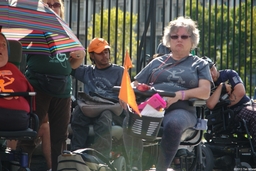
In spite of its seeming interest in our welfare, we should keep in mind who saddled us with a vague, inaccurate case definition, and a demeaning name, to start with.
The P2P is potentially the more damaging of the two initiatives, because it was sponsored by the NIH, which controls all major funding for medical research. (Find out more ... click HERE.)
ME/CFS is already grossly underfunded. Once this group of non-experts is done with their review, we will most certainly follow in the footsteps of Great Britain in its wholesale and uncritical adoption of CBT and GET as the only effective treatments for the disease. We will, in fact, no longer have a disease, but will be permanently and irrevocably reduced to having a mental condition that can be cured with a better attitude and a little fresh air.
There is no single right way to oppose the P2P. But there is a wrong way.
Saying nothing at all.
Silence on this important matter equals agreement. If we don't weigh in, nobody will do it for us. Even if you believe that resistance is futile, you will feel better if you express yourself than if you don't.
Does protesting really make a difference?
During my anti-war activist days, we were told repeatedly that nobody was paying attention to us. Years later we learned that public outcry - our public outcry - had prevented Nixon from dropping an A-bomb on Vietnam. History has demonstrated time and time again that protest can topple even the most entrenched institutions.
People with ME/CFS often feel as if nobody listens because physicians, friends, and even family members dismiss us. Government officials and representatives don't know that. They only know that an issue is important enough for you to tweet or send an email - and that you vote. They realize that for every citizen who bothers to communicate with them, there are a hundred who haven't. Sending a thousand tweets can have a huge effect.
Each of us may only be a single drop in an ocean - but an ocean is made up of nothing but drops. The important thing is to continue gathering those drops together until we've made a wave.
What we can do
Here are four things we can do that don't require much effort (see template below), and take up very little time.
1) Comment. The P2P has invited comments on its draft report. I really love it when people on these committees ask for comments. It gives me an opportunity to put my opposition on record, and to tell them all the ways in which they are wrong. Comments will be closed after October 20. CLICK HERE to make a comment.
Need ammunition for your comment? Jennie Spotila has posted a critique of the review stressing three main problems. Feel free to use her points in your comments:
A Review of the P2P Systematic Review
You can also use any part - or all - of my critique: The AHRQ Draft Report
2) Tweet. Every Saturday there is a "Stop P2P for ME" tweetstorm. Tweeting is fast, and it's fun. Use the hashtag: #StopP2P4ME. CLICK HERE for sample tweets that you can copy and paste, along with @ targets.
3) Email your representatives. This is still a democracy, and our representatives are supposed to represent us. That means they must listen to what we have to say. Even if you get a form letter in reply, somebody had to read your email to send it. Remind your representative that you vote.
Find your representatives here.
4) Boycott. Boycotting the process is fine, but boycotts are useless unless you tell people about it. You need to explain why you aren't participating - otherwise you are simply remaining silent, which is not constructive. You can email Dr. Francis Collins letting him know that the entire P2P Workshop on ME/CFS needs to be canceled.
Below is a template for a letter to your representative, and/or to Dr. Francis Collins (head of the NIH): [email protected]
Feel free to copy and paste, and to add anything else you have to say.
.................................................................
I am writing to request the cancellation of the P2P Workshop on ME/CFS. I believe that the P2P Workshop will not advance us towards the much needed ME/CFS research case definition or strategy, for the following reasons:
- ME/CFS experts have already adopted the Canadian Case Definition for research. No new definition is needed.
- The Workshop is examining the wrong illness. They are examining "medically unexplained fatigue," not ME/CFS.
- NIH has not engaged or involved stakeholders in a substantive way.
- The Workshop panel consists of non-ME/CFS experts.
- HHS has made numerous contradictory statements about the purpose of the Workshop, so its goal is unclear.
- The recent draft report from AHRQ is inaccurate, self-contradictory, and reflects a poor understanding of ME/CFS research
I hope you will give my concerns a fair hearing, and that you will cancel the P2P Workshop.
Sincerely,
[Your name]

 RSS Feed
RSS Feed
